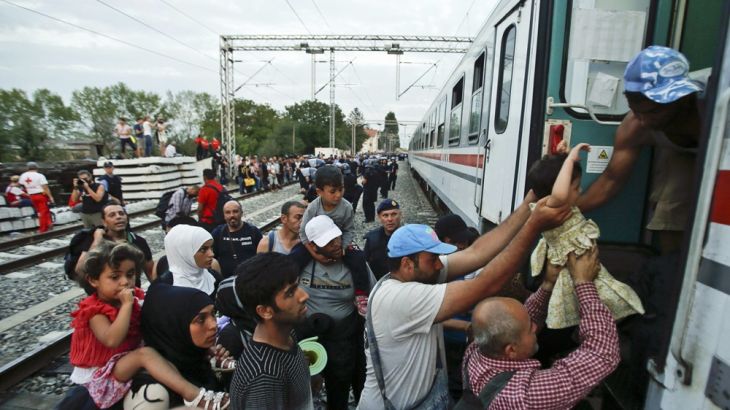Croatia ‘forcing’ Hungary to take in refugees
An estimated 8,000 refugees have crossed into Hungary from the Croatian border after taking a detour from Serbia.

Croatia has said it had “forced” Hungary to take in thousands of refugees, and would continue sending them to its northern neighbour, amid deepening discord in Europe over the biggest westward migration in decades.
Warning it was losing control of the refugee crisis, Croatian Prime Minister Zoran Milanovic said on Saturday that his country will give them food, water and medical attention, and send them on their way to Hungary.
Keep reading
list of 4 items‘Mama we’re dying’: Only able to hear her kids in Gaza in their final days
Europe pledges to boost aid to Sudan on unwelcome war anniversary
Birth, death, escape: Three women’s struggle through Sudan’s war
“There has not been an agreement with Hungary. We have in some way forced them to accept the refugees by sending them to the border, and we will continue to do so,” Milanovic said.
More than 20,000 refugees, many of them Syrian refugees, have streamed into Croatia since Hungary, on Tuesday, barred their route to the European Union through its southern border with Serbia with a metal fence, tear gas and water cannon.
OPINION: The grid of repression
Hungary’s border with Croatia, however, remains open, and the government of Milanovic has been busing the incoming refugees to the border, where 8,000 have arrived so far.
As the refugees continue to stream, Hungarian soldiers are also racing to build a fence on the Croatian side, just like the one on the border with Serbia.
Hungary has started to roll out coils of razor wire, but the Croatian leader Milanovic was dismissive of the move.
“Borders can only be closed by brute force,” he said, “and that means killing”.
Schengen zone
Meanwhile, on Croatia’s western flank, 1,200 refugees have crossed into Slovenia, like Hungary, a member of Europe’s Schengen zone of border-free travel.
Crowds were building on Saturday at border crossings and were kept back by riot police, who briefly fired pepper spray late on Friday.

But police began letting through small groups, mostly families, angering other refugees.
Al Jazeera’s Lawrence Lee, reporting from Bregana at the border between Croatia and Slovenia, said that as of Saturday afternoon, the situation of the stranded refugees has “eased” due to the help of volunteers and humanitarian workers.
“But the question you keep hearing being asked over and over again here is: ‘Why can’t the European Union, with all its money and resources, do any better than this?'”
Many of the refugees said they do not want to stay in any of these countries, as most are heading to Germany, where they believe they will have more of a chance of being granted asylum.
On Wednesday, EU leaders are to hold a summit to try again to reach an agreement on how to share about 120,000 refugees.
Even then, more are on their way, flowing by the several thousand every day over the Balkans’ borders, having reached Greece from Turkey by boat and dinghy.